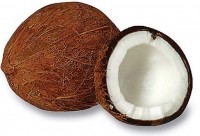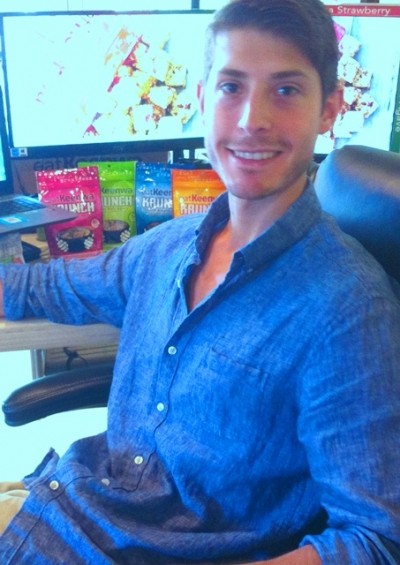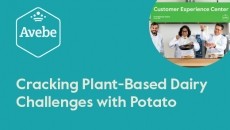60-second interview: the day job
What do you do? Gert Van Manen, president of iTi Tropicals

Tell us about your role as president of iTi Tropicals.
A big part is that of product management. The products we import are broken up into 10 product classes. As a project manager, my responsibility focuses on banana, coconut, passion and exotics. Phil Aubry, an industry veteran who joined us three years ago, is responsible for guava, papaya, pineapple, acai, acerola and mango. The responsibility of the project manager is to assess crop, pricing, supply and demand and then pull the trigger to buy.
We are not brokers. We take ownership of the product. We ship it from origin, we insure it, we finance it and we deliver it to warehouses across the US. We also guide our sales team to price the products for our customers. Our business model is very much like many retail brand holders who use co-packers to pack their product. We carefully select factories with whom we work with throughout the world, located in India, Indonesia, Philippines, Thailand, Ecuador, Peru, Mexico, Costa Rica and Brazil. These factories pack for us based on our specifications and purchase orders. Our meticulous choices of factories have resulted in long-term relationships—some over 20 years—that allow us to attack and solve problems when they inevitably occur, learn from each other and make both companies better.
Since we take ownership of the products, another part I am heavily involved in is making sure we have the appropriate credit lines to conduct our business. I also have some general management responsibilities such as setting company policies. Additionally, I handle the overall marketing and advertising part of our business. I am fortunate to be surrounded with inspiring and amazing coworkers.
How did you get into bulk coconut importing?
I was born and raised in the Netherlands. In 1983 I finished the Higher Economic School in Arnhem, the Netherlands and multinational trading company Ceteco hired me. The beauty working for a company like this for a young person was not so much the money but rather that within a year I started to travel to places like Angola, Mozambique, Cameroon, Chile and Honduras to trade products like palm oil, margarine, milk powder and other foodstuffs. I was even involved in a barter trade between East Germany and Angola in 1984. I still can picture myself crossing ‘Checkpoint Charlie’ in Berlin.
Ceteco merged with van Ommeren in 1987 in an effort to create a modern version of the legendary VOC (Dutch East India Company). In the meantime, I was sent as an expatriate to the US for Ceteco. My job was to create a new business of importing food ingredients from South and Central America. My first success was with Borja banana puree in 1987. I am proud to say that 27 years later I still work with the Borja family. After the merger it was decided to move away from foodstuffs. I asked the Board in Holland if it was ok that I leave the company with the banana puree supplier and start on my own. They agreed and I started iTi Tropicals in November 1988 with five other shareholders which since then all have been bought out leaving me as the 100% shareholder.
In 1988, there was hardly any market for tropicals. The US was consuming apple, soda and orange. I remember buying two loads of mango in the Philippines in 1990 and it took us two years to sell. We had to create demand. We were pioneering the tropicals market; same with coconut water. We bought the first load of coconut water concentrate, again in the Philippines, in 2004, and it took us five years to sell it all.
What are the best and worst parts of your job?
The best part is the people you meet all over the world and the people you work with at the office. Exchanging ideas, being exposed to many different cultures and viewpoints. The worst part is the uncertainty we deal with. Crops failing, wars, steel prices, oil prices, exchange rates, marine freight rate, everything that happens in the world affects our business and much of it you can’t control. Twenty-five years ago, the big challenge was finding factories that could produce up to the US quality standards. Now the biggest challenge is changing weather patterns that play havoc with crops.
If you could have one do-over in your career, what would that be?
Ha, I would be a DJ! I found a way to deal with this and installed a super sound system in the office so I make everyone listen to my playlists! Seriously though, I think entrepreneurship is in my blood and wouldn’t want to have missed this ride for anything!
Why do you think coconut water has taken off the way it has?
Originally embraced by endurance athletes as a natural alternative to branded hydration beverages, coconut water has been accepted by parents and active consumers alike. Coming out of the nut as low as 3.0° brix, coconut water has much less sugar then apple, orange or grape juices. I also believe that the combination of the three brands—Vita Coco, ONE and Zico—with iTi as an industrial pioneer all starting in 2004 to market coconut water were instrumental in the success.
Is there yet untapped potential in the coconut water market?
Coconut water’s biggest potential comes from its unique blendability with other fruit and vegetable juices. It has a neutral color and flavor that does not overwhelm the characteristic flavors and appearance of other juices.
In general, juices are a particularly delicious and convenient way to consume fruits and vegetables. But it is well known that many fruit and vegetable juices have high levels of naturally occurring sugars in addition to fiber and vitamins. We have seen many branded beverages made with 50% juice reduced to 30% juice, to 25% juice, to 10% juice and even less, which has prompted the so-called ‘race to the bottom’. So the US consumer appreciates that 100% juice is a sign of value and quality. Coconut water makes the 100% juice claim possible with far fewer sugar calories. We believe that coconut water as an ingredient for blended juices is just getting started and we believe eventually coconut water concentrate will be as significant as pineapple juice concentrate.
One thing that could derail the success of coconut water is the lack of quality control. We have been beating the drums now for two years that the industry needs to do something about the huge flow of new brands that jump on the bandwagon without proper quality control. We conducted a study recently, which we will continue, that many imported brands, almost all packed in Thailand but also Brazil, are adulterated. According to the laboratory, some of them are so bad that there are hardly any coconut solids in them. In other words, it’s sugar water. (Read about the study here.) Our audience is not the consumer, though, so it’s up to the leading brands to educate the consumer about sugar added or no sugar added coconut waters.
Click here to access FoodNavigatorJobs, the first global portal dedicated to the food and beverage industry.

















